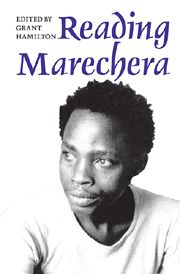Book contents
- Frontmatter
- Contents
- Notes on Contributors
- Introduction
- 1 A Brotherhood of Misfits
- 2 Blowing People's Minds
- 3 Grotesque Intimacies
- 4 Tracing the Stain in Marechera's ‘House of Hunger’
- 5 Menippean Marechera
- 6 Black, But Not Fanon
- 7 The Avant-Garde Power of Black Sunlight
- 8 Classical Allusion in Marechera's Prose Works
- 9 Revisiting ‘The Servants' Ball’
- 10 Marechera, the Tree-Poem-Artifact
- Bibliography
- Index
4 - Tracing the Stain in Marechera's ‘House of Hunger’
Published online by Cambridge University Press: 05 April 2013
- Frontmatter
- Contents
- Notes on Contributors
- Introduction
- 1 A Brotherhood of Misfits
- 2 Blowing People's Minds
- 3 Grotesque Intimacies
- 4 Tracing the Stain in Marechera's ‘House of Hunger’
- 5 Menippean Marechera
- 6 Black, But Not Fanon
- 7 The Avant-Garde Power of Black Sunlight
- 8 Classical Allusion in Marechera's Prose Works
- 9 Revisiting ‘The Servants' Ball’
- 10 Marechera, the Tree-Poem-Artifact
- Bibliography
- Index
Summary
Dambudzo Marechera's The House of Hunger is a text that has drawn widely divergent critical responses. As Drew Shaw makes clear in his essay ‘Transgressing Traditional Narrative Form,’ those critics who supported the official literary aesthetic of social realism in the newly independent Zimbabwe found much to be concerned about in Marechera's writing. Mbulelo Mzamane, Musaemura Zimunya and Juliet Okonkwo gave something less than a glowing recommendation of Marechera's experimental writing and in his book, Those Years of Drought: The Birth of Black Zimbabwean Literature in English, Zimunya derides the fractured nature of Marechera's writing, reducing it to nothing more than an ‘eclectic babble’ which cannot ‘enrich one's own culture.’ Evidencing this, Zimunya singles out the ending of ‘House of Hunger’ because he can see ‘no technical link between the last fragment of the novella … and the rest of the story.’ In a similar spirit, Okonkwo writes in her review of The House of Hunger that Marechera's writing is ‘deliberately … sordid and shocking.’ She goes on to write, his ‘excessive interest in sex activity, his tireless attempt to rake up filth, his insistent expression of a debased philosophy built around “stains on a sheet”’ is ‘alien to Africa – a continent of hope and realizable dreams.’ Importantly, these critics dismiss the value of Marechera's writing because it seems to consciously position itself outside of Emmanuel Ngara and Fay Chung's influential vision of Zimbabwean literature as something that can ‘play a truly positive and constructive role in the building of socialism in Zimbabwe.’
- Type
- Chapter
- Information
- Reading Marechera , pp. 57 - 75Publisher: Boydell & BrewerPrint publication year: 2013



